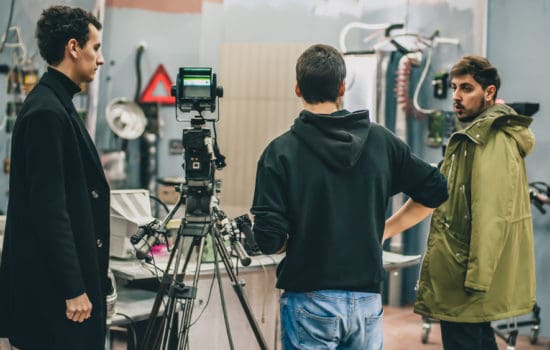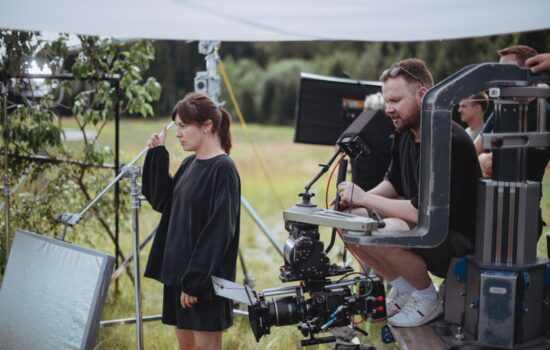Post Supervisor

How To Become a Post Supervisor
People also ask
Career Description
For Caroline Dobbe, Post Supervisor on the upcoming Amazon Prime show The Boys, a typical day on the job “depends on the day.”
On most days, though, her time is usually spent making sure nothing has gone wrong with the quality of the show’s picture. That means overseeing color correction and quality control. She also might drop any visual effects that are used for the show into the picture.
Dobbe also handles a wide assortment of paperwork. In many instances, a Post Supervisor has to manage billing, invoices and other budgetary concerns, so it’s important that she track those expenses and make sure that the production doesn’t go over the approved costs.
What is a Post Supervisor?
A Post Supervisor is the person working on a film or other project who facilitates the various post-production needs, such as editing, sound design, and color correction. The Post Supervisor makes sure that all of these processes are moving along according to the schedule set forth for the post-production phase and handles any issues that may arise during it.
Salary
The average annual salary for a Post Supervisor is approximately $50,900. The salary range for Post Supervisors runs from $41,000 to $67,000.
Any person in the role of Post Supervisor is a freelance (or contract) worker. However, the terms of that contracted work will depend on the type of show. Dobbe mentions that Post Supervisors don’t have a union, but they can still work on union shows. Because she currently works on such a show, her freelance terms include health insurance and automatic withdrawal of funds for taxes.
To reiterate, though, not all shows will provide those benefits, so it’s important for anyone who might take on the job of Post Supervisor to know what is offered to them through the terms of their contract. As far as salary range goes, Dobbe notes that what a Post Supervisor gets paid is more dependent on the show and studio producing it rather than on prior experience.
Hey, what do you think about trying our new Film Career HelperFilm Career Helper really quick? It’s totally free and could help get your career moving fast! Give it a try. It’s totally free and you have nothing to lose.
Career Outlook
The lifestyle of a Post Supervisor is somewhat straightforward with a few exceptions. For instance, Dobbe mentions that she hasn’t worked a weekend in a very long time, but there’s always the potential for it. As far as her weeknights go, it just depends. She might have a 10-hour day, or if there’s a deadline or a lot to be done, it could turn into a 17-hour day.
As Post Supervisor, Dobbe is constantly communicating with many people who are also working on the production. That includes the visual effects department, Assistant Editors, Post Coordinators, Company Producers, and Producers. She also works with outside vendors, such as the show’s Colorist, Online Editor and Scheduler.
Who is in charge of post-production?
The person who heads up the post-production process is the Post Supervisor. The individual in this role tends to oversee the editing, sound design, visual effects, and other aspects of this phase of filmmaking, as well as the communication between the people who carry out this work.
Career Path
When describing how she got to her current position of Post Supervisor, Dobbe is quick to mention that “everyone finds their own way.” She further explains, “It’s like you’re walking around an open box. Everybody will fall in at a different time in a different way.”
That being said, Dobbe’s start in the world of post-production began with her role as an Intern for Wolf Films. From there, she became a Production Assistant on The Ellen DeGeneres Show and then a Post-Production Assistant on The Office. She eventually moved up to Post Coordinator and landed a job on Rizzoli & Isles. While at Rizzoli & Isles, Dobbe was promoted to Post Supervisor and has carried that title with her to her current show.
While Dobbe’s career trajectory to Post Supervisor is a fairly straightforward one, she again emphasizes that there’s no one way to do it, so “don’t get frustrated” if one particular path doesn’t lead to an intended destination. Says Dobbe, “Just work hard, do your best and you’ll get noticed.”
A great avenue to becoming a Post Supervisor is getting a job as a Production Assistant or Post-Production Assistant. Why? Says Dobbe, “Because you get to know everyone involved on a production and can foster those relationships.” Plus, for an aspiring Post Supervisor, an Assistant position is an opportunity to build a foundation of knowledge.
But like any opportunity, Dobbe stresses that it’s up to the person in the position of Production Assistant to make the most of their time on the job. That means asking questions and being proactive in making contacts that might be helpful in the future.
To get started on the path to becoming a Post Supervisor, Dobbe has some tips:
- Study film and television.
- Get up-to-date on appropriate technology.
- Learn Mac computers, which are the industry standard.
- Know G Suite (Google Drive, Google Docs, etc.).
- Become familiar with various sharing platforms.
What are post-production roles?
Post-production on a film requires the expertise of multiple individuals, which translates into many roles needing to be filled for it. This includes the Film Editor, Film Composer, Sound Designer, Post Supervisor, and other professionals who work with them.
Experience & Skills
Much of the time, the job of a Post Supervisor revolves around understanding and using many different types of digital files and formats. That makes knowing the latest forms of film and television post-production technology extremely important.
However, Dobbe points out that the responsibilities of a Post Supervisor are different than those for an Editor, so knowing editing software isn’t necessary. But having working knowledge of sharing platforms, QuickTime and sound formats is just one component to being a Post Supervisor. Dobbe is quick to add that she learned all her tech knowledge on the job.
As there’s no typical day for a Post Supervisor, so too is there no typical personality that is the perfect fit for this role. But Dobbe does mention a few traits that could be helpful.
For one, she emphasizes having an upbeat demeanor, as “no one wants to be around someone who’s negative.” Being positive — and being able to give positive feedback to coworkers — is key to having a good work environment.
Also, because priorities can quickly shift on the job, it’s essential that someone wanting to be a Post Supervisor be able to easily switch gears. Communicating early and often with coworkers and having a “go with the flow” personality is likewise important.
What does a Post Coordinator do?
As their title implies, a Post Coordinator aids in the coordination of all the many processes involved during the post-production process. The Post Coordinator oversees the delivery of final elements, the scheduling of ADR sessions, and other post needs.
Education & Training
When it comes to education, Dobbe’s take is that a college or university background could be useful for individuals who have no industry contacts. For Dobbe, receiving her bachelor’s degree from Columbia College Chicago was a “foot in the door.” That’s because it gave her the opportunity to meet other people in the industry and receive internships that eventually led to her first entry-level job.
But college isn’t necessarily going to be the key to working as a Post Supervisor one day. “First, it’s who you know, and then it’s what do you know,” states Dobbe. So for anyone aspiring to be a Post Supervisor, explore any connections that might lead to an internship or Production Assistant position.
Dobbe adds, “You can’t understand the job until you’re in it,” which is also why it’s so important to get those entry-level jobs that can catapult someone to bigger opportunities. Given that it often takes even the most motivated individuals up to ten years to get to their dream job, the path to becoming a Post Supervisor takes time and patience.
Who works directly under the Post-Production Supervisor?
The people who usually assist the Post Supervisor are the Post-Production Coordinator and Post-Production PAs. The Post Coordinator works directly under the Post Supervisor. The PAs aid with additional duties and needs in this department.
Additional Resources
Dobbe has mentioned that Post Supervisors do not belong to a union, nor are there any professional organizations specifically for individuals in this career. But for someone looking to become a Post Supervisor, there are still many resources!
For one, Dobbe recommends all college or university graduates to get involved with their alumni organizations so that they can connect with others who might also be in the entertainment industry. Second, she suggests joining LinkedIn for the same reason. IMDb.com, which is the internet’s most comprehensive database of films, television shows, Actors and all other industry professionals, is a great resource as well.
Do you need a degree to work in post-production?
No, you do not need a degree to work in post-production. That being said, becoming a Post Supervisor entails the accumulation of diverse skillsets, as well as a wealth of knowledge about different post-production departments. In many cases, going to film school can help aspiring Post Supervisors get a head start on learning the job and gaining the experience necessary to one day step into this role in a professional capacity.
FAQ
What is the single biggest suggestion you would give to someone wanting to get into this career?
Dobbe’s advice? To have patience—both when it comes to working one’s way up the industry ladder to Post Supervisor, and after finally making it, when dealing with day-to-day work needs.
What’s the #1 mistake people make when trying to get into this career?
“Not asking questions!” says Dobbe. Too many people are eager to become a Post Supervisor, but not as many aspiring to that role ask the right questions so they can properly learn what it takes to be successful in it.
What is the question people should ask about this career but rarely do?
Dobbe answers, “Is the post world where I want to be?”
The entertainment industry depends on so many different specialties, and post-production professionals are vital to its success. But as with any other job, it’s important to check in and see if being a Post Supervisor is the right fit.
If you could describe in one word what makes you successful, what would it be?
“Ambition.”
Sources

Caroline Dobbe
Caroline Dobbe started her career path at Columbia College Chicago. After graduating she went on to get a job as an NBC Page in Los Angeles. It was a fun unique experience. Her next job was as a Production Assistant for The Ellen DeGeneres Show.
After a few months on Ellen, she went on to become a Post Production Assistant on NBC’s The Office. It was there that she gained her love for post-production. She has since moved up the ranks and is currently a Post-Production Supervisor for Sony/Amazon Show The Boys. She has worked on multiple shows over the years and hopes to continue working in post for many more years to come.
References
- 1. "Post Supervisor Salaries in United States". glassdoor.. published: Dec 14, 2019. retrieved on: Dec 6, 2019



















